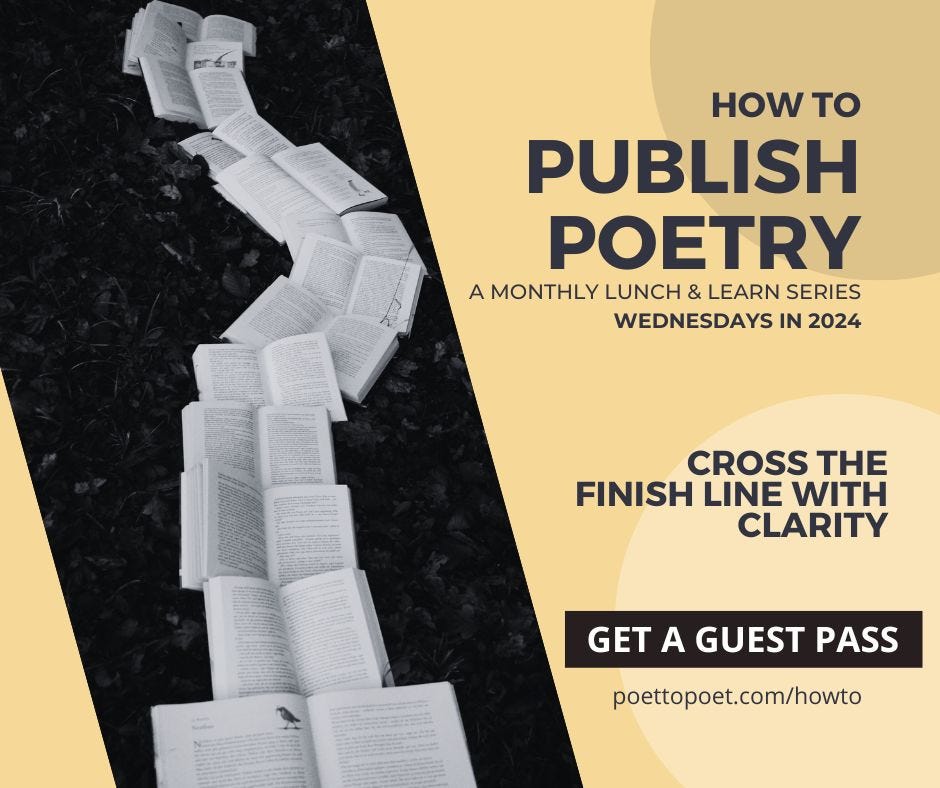Behind the Book: Insight #2
Don’t build a poetry collection alone—pick readers and mentors wisely.
“Do I have enough poems for a book?”
“Are these poems thematic and/or formally consistent enough to build a book? Are there big holes here? Do these poems, as a whole, say what I want to say?”
“Can this pile of poems really be a full-length collection? Should I go for a chapbook instead?”
“Wait … am I fooling myself? Are these poems good enough? Is this really worth trying to publish?”
These sorts of questions drove me to write and rewrite my first book, Bloodline, over about ten years.
Foolishly, I thought that those questions wouldn’t have the same intensity the second time around. “I have one book, I can build another one,” I thought. In fact, they were louder in the lead-up to my second collection, Pine Soot Tendon Bone (winner of the Washington Prize, due out in just a few months).
Although I still had to contend with the same challenges, certain sources of support gave me a tremendous advantage with book two. They’re a significant reason this book took just three years start to finish vs. ten years.
Rethink sources of support—choose readers wisely
Naturally, I was in a very different place in my life in writing book two, but one thing hadn’t changed: I was too close to the work to see it clearly. I still couldn’t answer these big-picture questions. Shuffling the collection around my desk, and in the stuffy attic of my own head, wouldn’t do.
My coaching clients all express similar points of confusion; I know this problem isn’t uniquely mine.
The thing is, our usual supports—workshops, writing programs, and peer groups—often cannot help us address big-picture questions about the body of work.
For this book, I did have several peer readers, poets who had written and published poetry books of their own. I trusted just a few, choosing people I knew would pay attention to the details and who wouldn’t get trapped in looking at my work through the lens of their own aesthetics and personal preferences.
Consider mentors
Confession: Mentorship may have been the single greatest factor in this manuscript’s success.
Before the book was a remote possibility, I had began working with a mentor who helped focus my attention on nuances of craft and language while providing insights about how to refine my approach to the emerging body of work, more generally.
(Side note: Mentors aren’t just for beginners. I had been publishing poetry for over twenty years and already had one award-winning book under my belt when I sought out this mentor. Poetry is a dynamic, evolving discipline. I will never be through wanting/needing fresh perspectives.)
While putting together the book, this mentor not only pointed out my blindspots but also gave me confidence that I had plenty of poems for a collection, and that, together, the individual poems could resonate as a collection.
We selected and sequenced the poems, structured the manuscript, and polished it with editors and publishers in mind. I was confident I had done everything I could prior to sending it out.
It was an iterative process, not one-and-done. Mentorship became a crucial container for finishing the book—providing accountability, consistency, focus, and trust.
This is the sort of support I try to offer my students and coaching clients. They say things like, “I couldn’t see the book clearly before; but now I do.” “I didn’t realize the structure could make such a difference.” “You gave me the insights I needed to build the book and have confidence sending it out.” “Now I have clarity about why publishers would be interested in this book.”
They are getting published, too. I can’t take any credit for their successes, of course, but I can say, based on my own experience, that having a container for the work—one with accountability, consistency, and earned perspective—can be the difference between the process taking ten years or three.
(If you missed the first installment in this series, read it here: Don’t start with the end in mind, but be deliberate.)
Takeaways
Getting input is essential, but not just any input will do.
It’s worth seeking the right sources of support. Just look at the acknowledgements page in any book you admire, where the poet admits: I can’t take full credit for this book in your hands.
What’s your experience? Have you worked with mentors or writer friends in the process of developing a manuscript? What did you learn?
Upcoming Events / Poet to Poet Community
How to Publish Poetry — Monthly Lunch & Learn
Yes, getting poetry published is challenging—but confusion is optional. You can get clear about what matters and be strategic about getting your poetry published with strategies at our monthly Lunch & Learns. The next one is February 14th. I hope you’ll join us—and bring your questions! Get a free guest pass.






ditto ditto ditto ditto ditto. Just to be clear, what Radha wrote: "pick readers and mentors wisely" --Those who will lead you away from terror and trepidation toward triumph.
Thanks for this timely read, Radha!